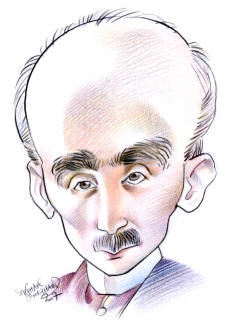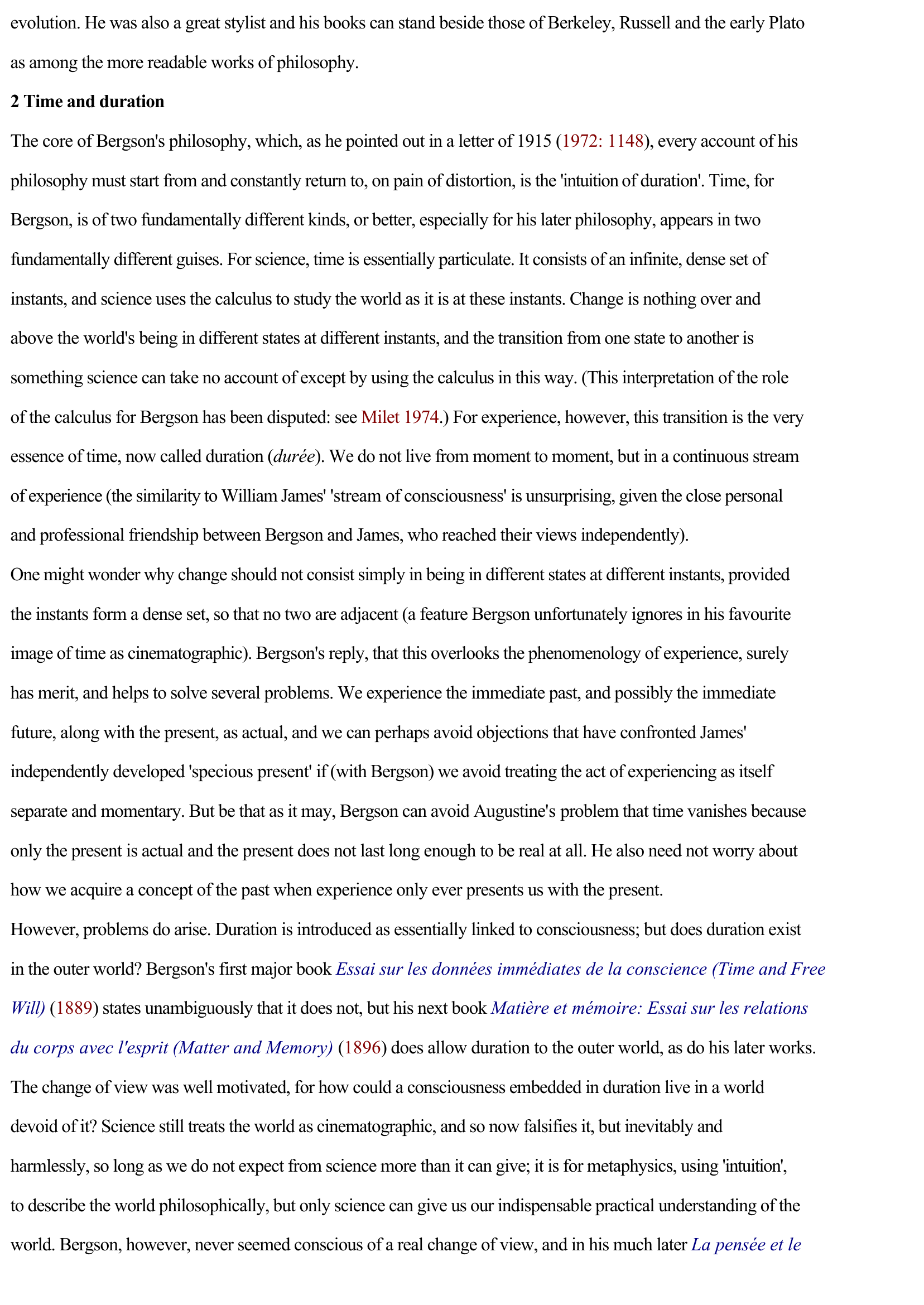Bergson, Henri-Louis
Publié le 22/02/2012

Extrait du document


«
evolution.
He was also a great stylist and his books can stand beside those of Berkeley, Russell and the early Plato
as among the more readable works of philosophy.
2 Time and duration
The core of Bergson's philosophy, which, as he pointed out in a letter of 1915 ( 1972: 1148 ), every account of his
philosophy must start from and constantly return to, on pain of distortion, is the 'intuition of duration' .
Time, for
Bergson, is of two fundamentally different kinds, or better, especially for his later philosophy, appears in two
fundamentally different guises.
For science, time is essentially particulate.
It consists of an infinite, dense set of
instants, and science uses the calculus to study the world as it is at these instants.
Change is nothing over and
above the world's being in different states at different instants, and the transition from one state to another is
something science can take no account of except by using the calculus in this way.
(This interpretation of the role
of the calculus for Bergson has been disputed: see Milet 1974 .) For experience, however, this transition is the very
essence of time, now called duration ( durée ).
We do not live from moment to moment, but in a continuous stream
of experience (the similarity to William James ' 'stream of consciousness' is unsurprising, given the close personal
and professional friendship between Bergson and James, who reached their views independently).
One might wonder why change should not consist simply in being in different states at different instants, provided
the instants form a dense set, so that no two are adjacent (a feature Bergson unfortunately ignores in his favourite
image of time as cinematographic).
Bergson's reply, that this overlooks the phenomenology of experience, surely
has merit, and helps to solve several problems.
We experience the immediate past, and possibly the immediate
future, along with the present, as actual, and we can perhaps avoid objections that have confronted James '
independently developed 'specious present' if (with Bergson) we avoid treating the act of experiencing as itself
separate and momentary.
But be that as it may, Bergson can avoid Augustine 's problem that time vanishes because
only the present is actual and the present does not last long enough to be real at all.
He also need not worry about
how we acquire a concept of the past when experience only ever presents us with the present.
However, problems do arise.
Duration is introduced as essentially linked to consciousness; but does duration exist
in the outer world? Bergson's first major book Essai sur les données immédiates de la conscience (Time and Free
Will) (1889 ) states unambiguously that it does not, but his next book Matière et mémoire : Essai sur les relations
du corps avec l'esprit (Matter and Memory) (1896 ) does allow duration to the outer world, as do his later works.
The change of view was well motivated, for how could a consciousness embedded in duration live in a world
devoid of it? Science still treats the world as cinematographic, and so now falsifies it, but inevitably and
harmlessly, so long as we do not expect from science more than it can give; it is for metaphysics, using 'intuition' ,
to describe the world philosophically, but only science can give us our indispensable practical understanding of the
world.
Bergson, however, never seemed conscious of a real change of view, and in his much later La pensée et le.
»
↓↓↓ APERÇU DU DOCUMENT ↓↓↓
Liens utiles
- BERGSON, Henri Louis (18 octobre 1859-4 janvier 1941) Philosophe Alors que ses maîtres sont convaincus qu'il doit s'engager dans une carrière scientifique, c'est à l'Ecole normale, mais en section lettres, que Bergson se présente.
- BERGSON, Henri Louis (18 octobre 1859-4 janvier 1941) Philosophe Alors que ses maîtres sont convaincus qu'il doit s'engager dans une carrière scientifique, c'est à l'Ecole normale, mais en section lettres, que Bergson se présente.
- BERGSON, Henri Louis (18 octobre 1859-4 janvier 1941) Philosophe Alors que ses maîtres sont convaincus qu'il doit s'engager dans une carrière scientifique, c'est à l'Ecole normale, mais en section lettres, que Bergson se présente.
- BERGSON, Henri Louis
- Biographie de BERGSON (Henri-Louis).

































